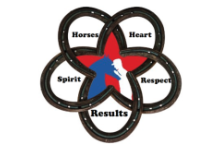Intermountain Equestrian Center, LLC (IEC) and a local private college introduced an Equine Assisted Services (EAS) client program in 2010 which focused on troubled youth and special needs clients. Equine Assisted Services (EAS) has been utilized since the 1960’s in the rehabilitation of people with physical disabilities.
Recent national and Veterans Administration (VA) studies now testify to the success of EAS in treating the mental health conditions of combat Veteran’s ... 阅读更多
Intermountain Equestrian Center, LLC (IEC) and a local private college introduced an Equine Assisted Services (EAS) client program in 2010 which focused on troubled youth and special needs clients. Equine Assisted Services (EAS) has been utilized since the 1960’s in the rehabilitation of people with physical disabilities.
Recent national and Veterans Administration (VA) studies now testify to the success of EAS in treating the mental health conditions of combat Veteran’s including post-traumatic stress disorder, depression, anger management and traumatic brain injury. Consequently, IEC expanded the EAS focus to helping military Veterans.
HSHI was formed as a non-profit corporation in 2014 to fulfill the need identified by IEC. IEC had been a member center under the Professional Association of Therapeutic Horsemanship (PATH Intl.) and assisted HSHI in its receiving Premier Accredited Center status for its EAS programs in October 2016.
HSHI currently employs a Program Director, PATH certified instructors and utilizes specialized consultants as needed. It also relies extensively on trained community volunteers to help with EAS sessions and other program tasks.
Yellowstone County has a large Veteran population, access to superior medical facilities, and proximity to the VA Clinic. The Clinic works closely with HSHI through a Memorandum of Understanding; and provides referrals, clinical therapists as needed, and eligibility screening. Our service area includes Yellowstone County and the eight adjacent counties. All services are provided to Veterans at no charge. In recent years, HSHI has expanded its program to include Veteran family members, also at no charge.
The Intermountain Equestrian Center, the Billings VA Clinic, other Veterans programs, community partners, and renewable grants and contributors support continued sustainability of the program. HSHI’s administrative and fundraising expenses are only 5% of total expenses; with 95% going directly to program activities.
HSHI offers 3 areas of EAS programming for Veterans based upon their individual needs. These include Therapeutic Riding, Equine Assisted Learning and Equine Facilitated Psychotherapy. Horses teach about relationships, how to respect and how to earn respect, how to work in partnership and the result of working in opposition, how to lead and how to listen.
Following a referral from a VA source, each individual participant meets with the Program Director in conjunction with VA therapy staff (and/or others as deemed appropriate) to develop a treatment plan based on their unique goals. They then begin their horsemanship journey with approximately three groundwork sessions.
In these sessions, they work with their horse on the ground, building relationships and learning fundamental skills such as general care, grooming, tacking, and leading. HSHI’s PATH certified instructors also teach riding skills with the intention of beneficially contributing to an individual's physical, mental, emotional and social well-being. The training provides an opportunity for participants to develop a trusting bond with their horse, instructor and volunteers.
All sessions use a solution-oriented approach, encouraging clients to seek their own effective path when encountering unfamiliar tasks and develop insights based on their own reactions to the situations. It has been shown to improve concentration, patience, problem solving and sequential thought processing. Physical benefits include increased balance and posture, core muscle strength, coordination, and motor control. For individuals with impaired mobility, the movement of the horse simulates to a human walking gait.
Participants have multiple adaptive equine activities available if they wish to expand skill development such as roping, driving, packing, barrel racing, jumping, equine Frisbee and soccer, trail riding activities, modified skijoring and color guard.
Ask anyone who has spent time on a horse—the connection is intimate. And, undeniable. Horse. Human. Bond. The ability to heal follows.
隐藏完整文本